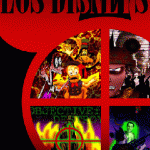2003
Kembrew McLeod, fresh from having trademarked the phrase freedom of expression®, speeds through the domain name scandals of the information superhighway.
Paul Collins on collegiate content: syllabus, discussions, lectures, and all.
An essay by Tara McPherson (and a conversation with Anne-Marie Schleiner) concerning patch mutations, opensorcery, and other explainable gaming offshoots.
Part 2 of The Politics of Information, a collection that reintroduces class and materiality to the study of technocultures.
Tempering the myth of global variety, David Golumbia processes the dominance of English in digital environments - and a highly standardized English at that.
Lisa Nakamura questions Donna Haraway about race, speed, and the cyborg.
Nick Dyer-Witheford figures the place of video games in the global market, drawing on Marx's "species being" for scratch paper.
U.S. Steel chiefs and AOL-Time Warner executives span one hundred years of decimation wrapped in rhetoric. John Monberg annotates their enduring logics of expansion.
A call for (and example of) material studies of software from Matt Kirschenbaum, spurred by the Digital Arts and Culture conference, 2000.
On the imminent publication of the first alt-x critical e-book.
Marc Bousquet introduces a forthcoming Altx critical e-book, hosted online by ebr, appearing in five sections through the Fall of 2003. A new ebr thread, Technocapitalism, is built around its concerns.
Charles Bernstein's reflections on populism, democracy, and authority in the turbulent waters of web discussion groups and other new Internet sites.
A first-person narrative of Hactivism, Performance, and growing up at the U.S./Mexico Border from Fran Ilich.
Katherine Wills' anti-interview with Mark Amerika about Internet art.
Bennett Voyles' retrospective on the apolitical Nineties, and the fate of democratic electronic activism without content.
A discussion of net.activism, net.tactics, and strategy featuring Bruce Simon, Geert Lovink, Chris Carter, and Ricardo Dominguez.
The story of an activist website's shutdown, as told by DeeDee Halleck, with interstitial e-mails.
Steve Shaviro reviews Tomorrow Now by Bruce Sterling, a book that (for an eminent cyberpunk novelist) is perhaps too sane and sensible.
In between bubble and burst, e-commerce drew much of its content from donated labor. Tiziana Terranova questions just how "free" such labor has proved in practice.

